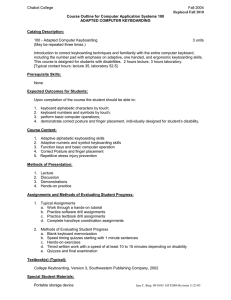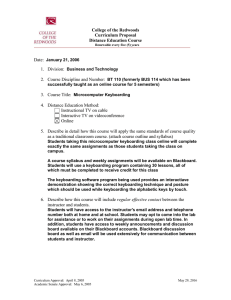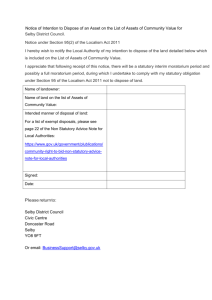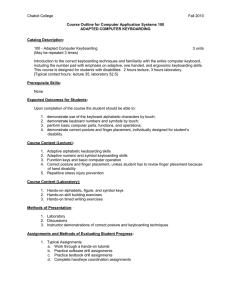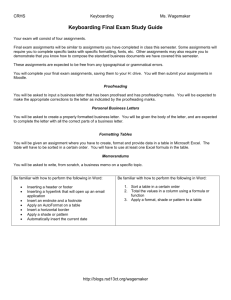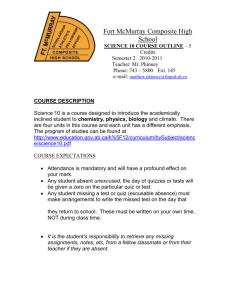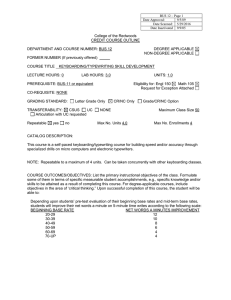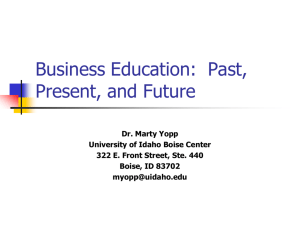Course Outline and Evaluation: Information Processing 10
advertisement
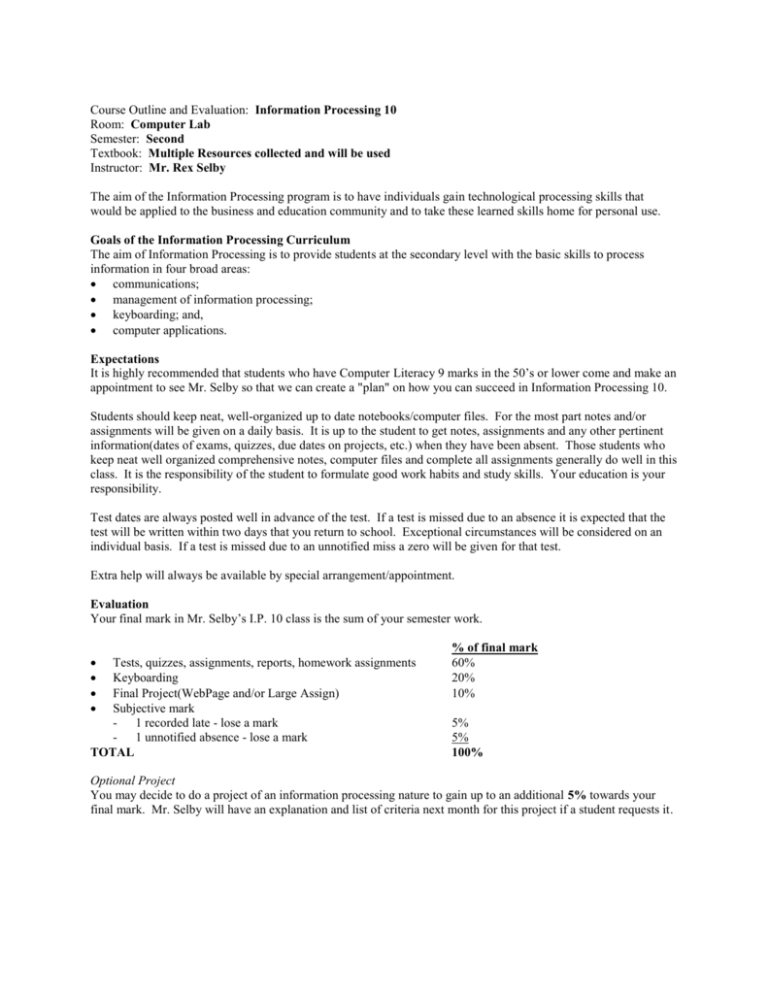
Course Outline and Evaluation: Information Processing 10 Room: Computer Lab Semester: Second Textbook: Multiple Resources collected and will be used Instructor: Mr. Rex Selby The aim of the Information Processing program is to have individuals gain technological processing skills that would be applied to the business and education community and to take these learned skills home for personal use. Goals of the Information Processing Curriculum The aim of Information Processing is to provide students at the secondary level with the basic skills to process information in four broad areas: communications; management of information processing; keyboarding; and, computer applications. Expectations It is highly recommended that students who have Computer Literacy 9 marks in the 50’s or lower come and make an appointment to see Mr. Selby so that we can create a "plan" on how you can succeed in Information Processing 10. Students should keep neat, well-organized up to date notebooks/computer files. For the most part notes and/or assignments will be given on a daily basis. It is up to the student to get notes, assignments and any other pertinent information(dates of exams, quizzes, due dates on projects, etc.) when they have been absent. Those students who keep neat well organized comprehensive notes, computer files and complete all assignments generally do well in this class. It is the responsibility of the student to formulate good work habits and study skills. Your education is your responsibility. Test dates are always posted well in advance of the test. If a test is missed due to an absence it is expected that the test will be written within two days that you return to school. Exceptional circumstances will be considered on an individual basis. If a test is missed due to an unnotified miss a zero will be given for that test. Extra help will always be available by special arrangement/appointment. Evaluation Your final mark in Mr. Selby’s I.P. 10 class is the sum of your semester work. Tests, quizzes, assignments, reports, homework assignments Keyboarding Final Project(WebPage and/or Large Assign) Subjective mark - 1 recorded late - lose a mark - 1 unnotified absence - lose a mark TOTAL % of final mark 60% 20% 10% 5% 5% 100% Optional Project You may decide to do a project of an information processing nature to gain up to an additional 5% towards your final mark. Mr. Selby will have an explanation and list of criteria next month for this project if a student requests it. Content The curriculum goals for Information Processing 10 will be covered in the following three models set out by Saskatchewan Education: Core Model 1 - 50 hours Information Processing for Personal Use - Tables - timestable, etc. - Windows Environment/ Directories - Email - resume/cover letters/ interviews - personal letters/ business letters - rough draft - ecological & environmental report - typing for other subjects Model 4 - 25 hours Keyboarding and Word Processing - Notes - ProperKey, WorkHabits, etc. - Typing Tests(GWAM/ CWAM) - Title Pages Projects – Computer Terminology, Ergonomics, Impact of Technology, Tickets - Computer Components - Proofreader Marks - Handwritten - Numeric Key Pad Model 5 - 25 hours Introduction to Computer Software Applications - Databases & Spreadsheets - Internet Evaluation - Publisher - Power Point - Dreamweaver - Fireworks Optional Units used from IP 20 – time permitting Core Model 2 - 50 hours Business Information Processing - Tables - Timestable, Memo pad form, etc. - Windows Environment/ Directories - Filing systems - Crossword Terminology Larger units - Spreadsheets, Databases, PowerPoint presentations, Business letters, Telephone Etiquette/Postal Services. Model 6 - 25 hours Skills for Entry-Level Employees - Video conferencing - Financial forms - Evaluation templates - Office experience form - Dictation - Oral communication - SRC Tasks # 1 – 7 Model 7 - 25 hours Business Keyboarding and Word Processing - Journal entries - Stocks – watching and recording a particular international business gains or losses - High Tec Telephones research - Merge documents - letters, memos, envelopes
